Home » Int’l Trade Connections
Definitions
Offshoring
Off shoring is one of the defining phenomena of 21st century manufacturing. It attracts signifi cant attention in academic, business, and social circles in both developed and developing economies. Despite the relevance of this phenomenon, there is limited research exploring to what extent off shoring eff ort is explained by manufacturing strategy. In this study I investigate whether off shoring effort can be predicted by manufacturing competitive factors such as cost, flexibility, and delivery, particularly when controlling for structural covariates from internalization theory. Data from an international manufacturing survey enable the analysis. Results suggest that competing based on cost and flexibility, but not on delivery, explains the effort to relocate sourcing and design activities to a foreign country.
Source: International Journal of Production Economics, Volume 150, April 2014, Pages 163-173
sciencedirect.com
Backshoring
Comparing offshoring and backshoring: The role of manufacturing site location factors and their impact on post-relocation performance
Highlights
Source: sciencedirect.com
Reshoring
Prior to reshoring: A duration analysis of foreign manufacturing ventures – ScienceDirect
Abstract
This paper throws light on the determinants of the duration of manufacturing offshore experiences by US and European firms prior to reshoring. By applying survival analysis to a dataset of 249 offshoring experiences terminated with a relocation to the home country/region, we estimate the effects of different groups of survival determinants. Results highlight that contextual factors such as the industry, the home country, the host country, and the size of the firm significantly affect the duration of offshoring experiences. The likelihood of termination is in fact higher for the electronics and automotive industries, for small firms, for firms headquartered in Europe, and for offshoring to Asia. The analysis of the motivations for reshoring shows that quality issues experienced offshore emerge as the key factor giving rise to shorter offshore stays. Based on these empirical findings, a set of testable propositions is developed. In particular, we conjecture that the likelihood of termination of offshore manufacturing and the return to the home country may be accelerated by technology-based industries, small firm sizes, shrinking cost differentials and the psychic distance between home and host country, the organizational archetypes, and quality related motivations.
Source
International Journal of Production Economics, Volume 169, November 2015, Pages 141-155
doi.org
sciencedirect.com
The reshoring of business services: Reaction to failure or persistent strategy?
– ScienceDirect, Journal of World Business Volume 52, Issue 3, April 2017, Pages 417-430,
sciencedirect.com
For each of these below countries AWS is able to produce a report oriented to the customer’s needs.
From the report produced, we will identify the activities to be finalized in that country
AWS undertakes to produce a detailed business plan (Financial plan and marketing plan, and organizational plan) indicating the partners and the timescales to achieve the defined objectives.
Once the business plan has been approved, the initial budget will be drawn up and the current budget will be checked, highlighting moment by moment the deviation and the Gannt of each activity included in the Project.
An agreement will be stipulated which will be based on a performance logic. Much more likely a joint venture according to the JVCA (Joint-Venture Contract Agreement) modalities.
The demand for software developers continues to grow very significantly around the world.
Developed countries are increasingly focusing on developing countries (GDP per capita below $ 20,000).
The orientation of employers is mainly focused on countries with political stability and not bordering on war scenarios.
The countries that have passed laws in favor of developers and in favor of foreign companies that employ indigenous labor stand out.
Albania has taxed income in excess of $ 120.00 / year to Albanian citizens who obtain money from foreign countries. This has facilitated the entry of foreign companies, effectively avoiding the brain drain and therefore Albanian know-how is growing rapidly.
Germany, the United States, Great Britain, Italy found it very advantageous to hire Albanian developers.
However, the risks for foreign companies are not zero.
Strategies are needed to identify these risks, monitor them constantly, and be able to shut them down immediately.
Restless resources attracted by dynamic wage offers receiving increasingly irresistible offers from foreign companies.
Resources that alter their CV to sell themselves beyond their real experience.
Technological blackmail to obtain contract revisions ever more quickly.
Therefore, a joint venture with an experienced partner rooted in the field is essential to maximize the benefits and minimize the risk
Our headquarter is in Tirana because we try to hire the majority of resources in Albania where the best conditions exist compared to other European countries:
The other countries where we are able to hire resources in the IT and IT sector are:
Turkey
Export Gliko syrup

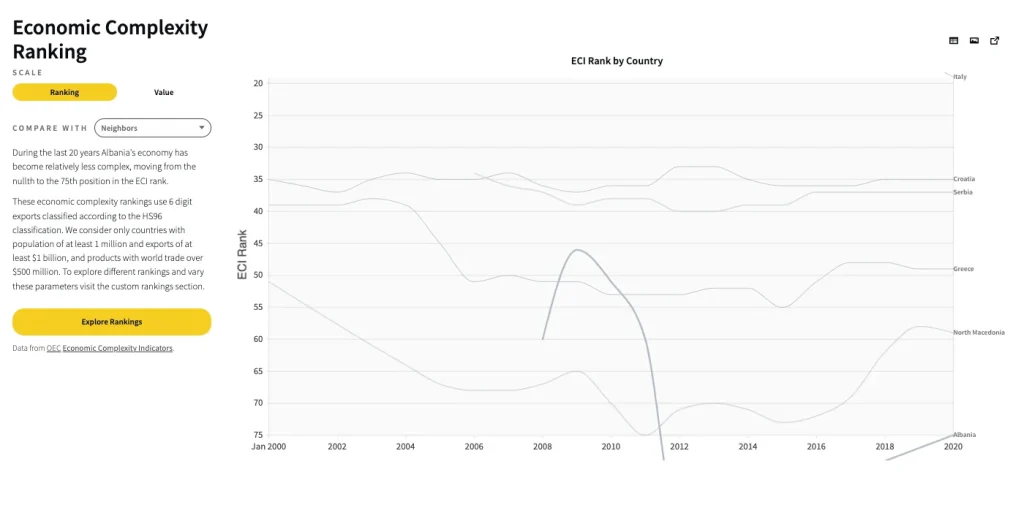
Source: oec.world/en
We are located in Reno in the Washoe County of Nevada State, US and this area is growing very fast in the information technology industry.

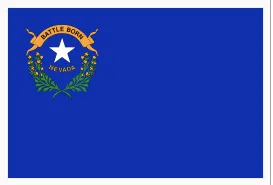
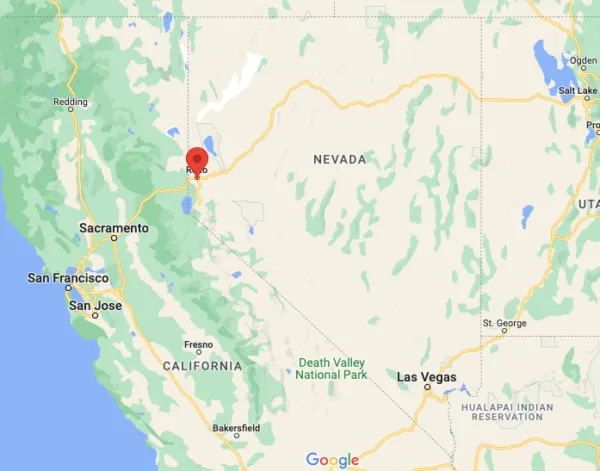
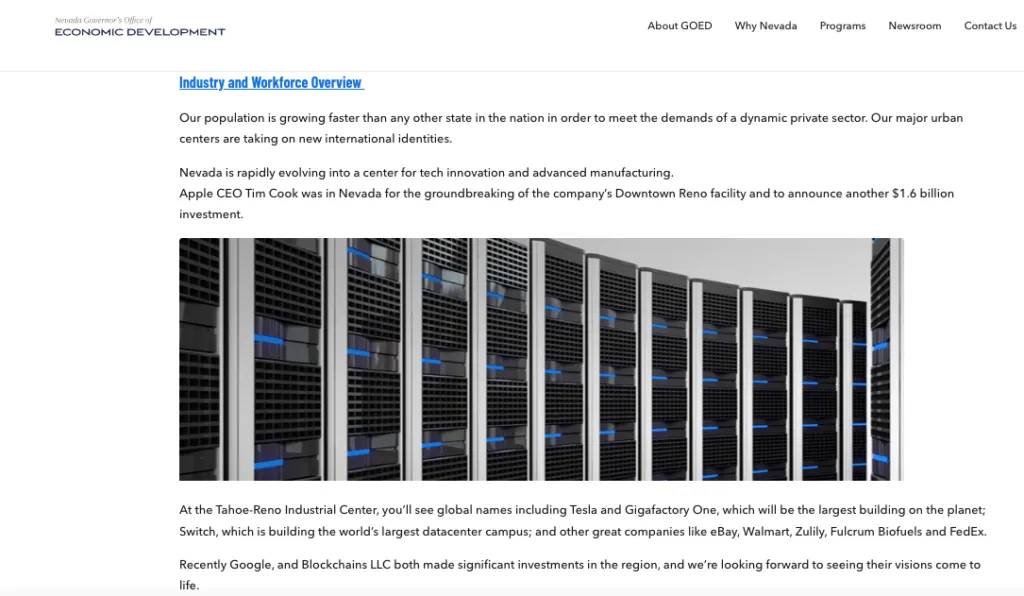
Source: goed.nv.gov
NEVADA ADVANTAGE
Source: goed.nv.gov
DOING BUSINESS IN NEVADA
Nevada has always been popular states for businesses. One of the main reasons for that are low-cost startup, regulatory, licensing and annual fees, taxes and tax structure, privacy of business owners and competitive utility rates for commercial operations.
Nevada Tax System:
Nevada ranks as a 7th best state in the Tax Foundation’s 2020 State Business Tax Climate Index, an independent ranking of states in five areas of taxation: corporate taxes; individual income taxes, sales taxes, unemployment insurance taxes, and taxes on property, including residential and commercial property.
Nevada takes it seriously with attracting new businesses because of taxes. There are plenty of taxes which you must pay in other states, but not in Nevada. Here are the main tax advantages of this state:
The Tax Climate Index comparison to neighboring states is significant: California ranks 48th, Arizona 20th, Idaho 21st, Oregon 8th and Utah 9th.
Geographic Location and Infrastructure:
The combination of a rich transportation infrastructure and the geographic location – proximity to west coast/California markets and businesses, reduced shipping and storage costs are important reasons for businesses to stage their operations in Nevada.
Road Transportation – Collectively, the cities of Las Vegas, Reno, Sparks, Carson City and surrounding towns are less than one day’s drive over arterial interstate highways to nearly 60 million consumers as well as to the major U.S. deep water seaports serving the Pacific Rim.
Rail Transportation – Major Union Pacific and Southern Pacific rail connections in Las Vegas and Reno also, too, play an essential role in carrying the world’s freight from the Pacific Coast to America’s Heartland and beyond.
Air Transportation – Globally, McCarran International Airport in Las Vegas has been a Top 20 airport for more than five years, annually serving more than 40 million and handling more than 189 million pounds of cargo. More important, the airport is served by nonstop flights to and from nearly all major metropolitan areas in the United States as well as several important global centers in Europe, Asia and Latin America.
In the north, Reno Tahoe International Airport consistently earns recognition as one of the most efficient and friendly airports, serving more than 3.8 million passengers and receiving more than 114 million pounds of cargo annually. The airport serves more than a dozen cities with nonstop flights, and more than 35 cities with a single stop.
Cost of Living:
For businesses, when making their decision regarding expanding, relocating or creating a startup operation, it is important to know cost of living. Use cost of living calculator to calculate and compare cost of living between certain cities:
Cost of Living Calculator
BUSINESS ASSISTANCE PROGRAMS:
For businesses in key industries willing to make multi-year commitments to jobs and capital investments, Nevada offers several attractive packages of incentives and programs to assist businesses through the Governor’s Office of Economic Development.
These incentives and programs include following:
Business Development & Assistance:
Tax Incentives Opportunity Zones
Workforce Development:
Workforce Innovations for a New Nevada (WINN) Learn & Earn Advanced-career Pathways (LEAP)
Innovations Based Economic Development
State Small Business Credit Initiative/Battle Born Venture Fund State Small Business Credit Initiative/Collateral Support Program Nevada Opportunity Fund Knowledge Fund
International Trade:
STEP grant Nevada Global
Rural Community & Economic Development:
CDBG Nevada Main Street
Procurement Assistance & Outreach (PTAC) Nevada Film Office Tax Incentives Emerging Small Business Program
Source: goed.nv.gov
OPPORTUNITY ZONES
The Opportunity Zone program, established in The Tax Cuts and Jobs Act of 2017, is a tax incentive, designed to encourage long-term private investment in low-income communities. The program essentially runs on two tracks – first, Governors in each state nominate opportunity zones, which are low-income community census tracts that could benefit from significant private investment. Second, once the zones are certified by the U.S. Treasury Department, interested private investors must invest in opportunity funds, specialized vehicles that can then be utilized to invest in the certified opportunity zones.
US Dept. of Treasury – Community Development Financial Institutions Fund Mapping Tool.
*New* U.S. Government Accountability Office Report:
Opportunity Zones – Census Tract Designations, Investment Activities, and IRS Challenges Ensuring Taxpayer Compliance.
Source: goed.nv.gov
Other sources
ibisworld.com
In Japan we have connections with Japanese and Italian/European art experts for possible cultural exchanges (exhibitions, etc.).
We have other important entries for the import and export of food.
Connections with drone experts and cutting-edge IT technologies.
Teamwork can sometimes really pay off. So a joint venture with another company in Japan may be an excellent opportunity to grow your own business without the complexities of making an outright purchase of another company.
In Japan, a joint venture is the structure permitted under Japanese Law that enables Japanese and foreign companies to combine their knowledge and resources to work as a single team. The joint venture gives partners the opportunity to leverage each other’s strengths while compensating for any weaknesses.
In one type of joint venture, both parties enjoy the benefits of remaining as independent businesses and choose to enter into a contractual agreement only to collaborate in a limited way over a pre-determined time span.
The other option is to create a separate joint venture company in order to complete a specific project or contract. In this option, both British and Japanese partners own shares of the company and direct its management.
Access to knowledge and resources such as capital, staff and technology;
Access to new opportunities such as new markets or greater distribution reach; and
Shared exposure to risks, financial responsibility and workload.
Source exporttojapan.co.uk
We have some software developers located in Algeria managed by a partner connected to us with whom we exchange expertise and skills.
We have some special trade connections for fruit and fresh fish export from Algeria.
Entries to export products from the chemical-pharmaceutical sector and machinery dedicated to the automation of industrial and semi-industrial production.
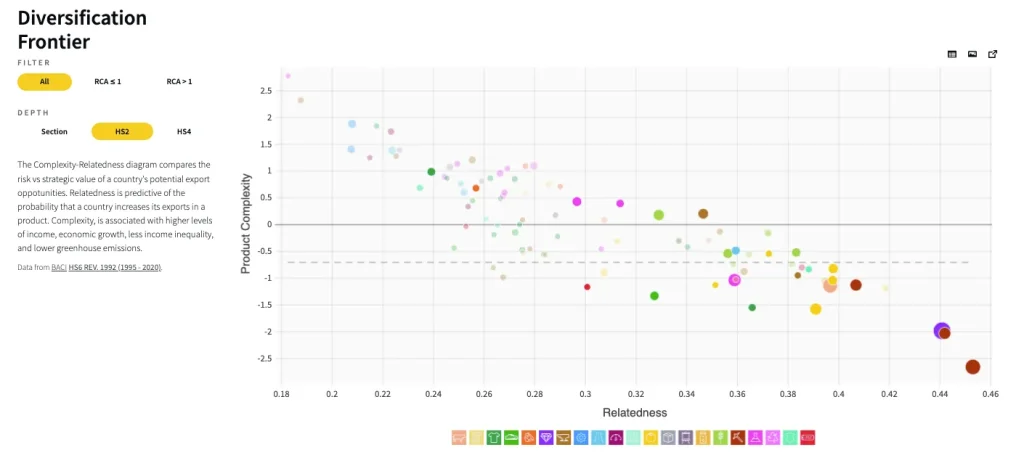
Source: oec.world/en
Senegal Economy
Senegal has a well-diversified economy, which is characterized by a high reliance on imports, a low rate of exports, and a very small local market. Moreover, 60% of the population now works in agriculture, which accounts for less than 17% of the country’s GDP. Dakar, like most other West African capitals, is engulfed by informal traders, who control a large portion of the labor market.
Despite a continuous fall and stagnation in prior years, Senegal’s economic development has improved since 2016. Even though the country has not always been a popular investment destination, owing to decades of political stability, it remains far more appealing to a large number of international investors and economic prospects.
The majority of Senegalese workers are employed in the fishing and agriculture industries, although other sectors such as tourism and industry are beginning to expand. Furthermore, various areas may be explored, and the country’s investment prospects remain quite promising.
1.Marine Business
The European market for fish and seafood is increasing considerably and provides enormous prospects for providers. A rising percentage of European customers is increasing their diet of fish.
As a seafood provider, Senegal enjoys competitive benefits. This is due to its relatively excellent quality, the ability to enhance more, and the tale to be told.
The market demand for Senegalese fish is rising quite much. This gives fish and seafood enterprises in Senegal significant prospects.
Related Books- Agriculture, Agro Based, Bakery, Wood, Ice Cream, Chocolate Cereal Food, Confectionery, Dairy, Farming, Fisheries, Food & Beverages, Fruits, Meat, Milk, Oils & Fats, Snacks, Spices, Vegetables, Flowers, Rice, Wheat, Corn, Tobacco And Tobacco
2. Agribusiness
The typically sunny and seasonal Senegalese farming. In 2008, around three-quarters of the country’s workforce was employed by the agriculture industry. The great majority of farmers are farmers, who combine cash and subsistence crops (millet, sorghum, maize, and rice), and also have some cattle. Senegal is the most food-influenced country in western Africa after Mauritania.
The cereals and most of its milk, vegetable oil, and food processed are imported by Senegal at 70 percent. The second-largest net importer of rice in Africa after Nigeria continues to be Senegal, largely from Asia. In 2008, 600,000 tonnes of rice were imported from Senegal.
3.Medical Equipment Business
Dakar is the first rich health center in western Africa to invest in new and improved equipment in both the public and commercial sectors. There will thus be an opportunity for pharmaceutical providers and medical equipment to reach this attractive market.
The country of western Africa has witnessed an increase in the number of public, commercial, and mobile health facilities in recent years, boosting healthcare needs.
Related Projects:- Surgical, Medical Plastics, Medical Disposables, Disposable Medical Products used in Hospitals
A worldwide popular industry is the supply of medical equipment and consumables (non-medical equipment). Senegal has recently seen significant expansion in this commercial sector.
Indeed, the coronavirus pandemic, which necessitated the use of Personal Protective Equipment (PPEs), had a crucial role in motivating individuals to begin selling medical equipment and consumables.
Finding the right startup business is one of the most popular subjects today. Starting a business is no easy endeavor, but the time, effort, and challenges can be worth it if you succeed. To give yourself the best chance to be successful, take your time to carefully find the right business for you.
4. Dried Fruits Business
The dried fruit market is expected to grow at a CAGR of 4.90 percent from USD40.116 billion in 2019 to USD53.439 billion by the end of 2025, from a market size of USD40.116 billion in 2019.
The market for dried fruit is being driven by a shift in customer choice for healthy and nutritious meals as a result of rising obesity and an aging population. Furthermore, rising demand for dried fruit has been spurred by greater acceptance of healthful packaged foods and widespread use of dried fruit in the dairy, bread, snack, and confectionery sectors.
The growing trend of on-the-go snacking has accelerated the market’s rise in recent years. Dried fruits have become a popular healthy snack due to characteristics such as low perishability and portability.
We have some software developers located in Algeria managed by a partner connected to us with whom we exchange expertise and skills.
We have some special trade connections for fruit and fresh fish export from Algeria.
Entries to export products from the chemical-pharmaceutical sector and machinery dedicated to the automation of industrial and semi-industrial production.
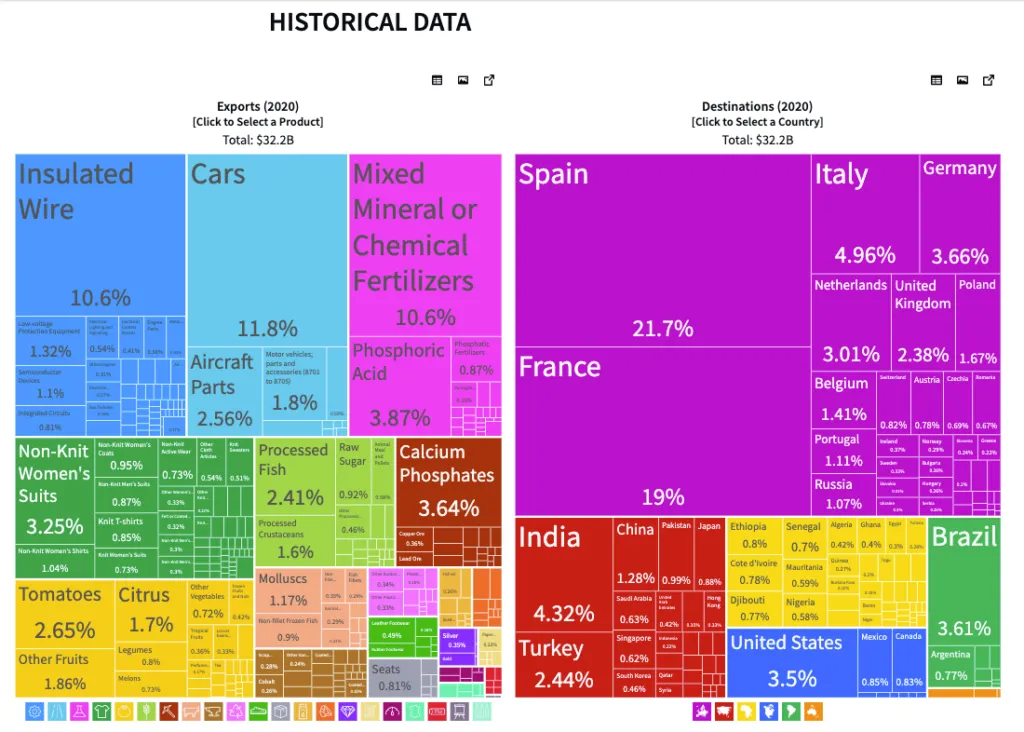
Source: oec.world
5 Business Ideas Profitable in Morocco
With its position as a stepping stone for Africa and the Middle East, Morocco is becoming an increasingly important industry player in the EMEA region.
Once the GDP has averaged 4.4% over the last 15 years, there are positive signs that it will continue to increase economic growth in Morocco. As the third-largest recipient of foreign investment in 2014, its finances and telecoms sectors are favorable to the country.
In North Africa, Morocco is the FDI king. The pragmatic FDI approach and more skilled staff available in comparison to most advanced economies have been of value to Morocco, thanks to historical links and proximity to Western Europe. It is gradually seen as a positive conduit for investors in the rapidly developing African continent from the USA and Europe. This is because of its secure market and support facilities in combination with good air connections to many other countries in Africa.
1. Renewable Energy in Morocco
By 2030, by using green energy sources Morocco expects to meet half of its energy requirements. Morocco is constructing a 580MW total energy plant with the world’s biggest solar power plant. Morocco expanded hydropower production in wind farms from 80 MW in 2010 to 2000 MW in 2020. In Morocco, the 300 MW Tarfaya will be built as the largest wind project in Africa by GDF Suez and Narva.
2. Moroccan Automotive Industry
It is the second biggest vehicle manufacturer and first passenger car producer in Africa to go to South Africa. South Africa. In 2019, there were more than 250 firms in the Moroccan automotive sector, generating over 150 million direct jobs (in 2014-2019) and manufacturing more than 400 000 cars with a local integration rate of 60%. Today in Morocco there are four major industrial interconnected hubs (Tangier, Kenitra, Rabat, and Casablanca) and four specialist training institutions.
3. Fast Food Business
Moroccans living in bigger cities will be able to eat more and more at home, especially during the week’s lunchtime. Also, it’s becoming more popular for family members, friends, and even business partners to eat with the increased acceptability of eating meals outside the domestic region.
Healthy food in Morocco is quickly gaining traction, particularly among rich socio-economic groups who are increasingly interested in organic goods. For example. The opening of many salad bars in Casablanca is an example of this pattern.
4. Poultry Business
Poultry is said to be one of Morocco’s cheapest and one of the most unique start-ups. Agriculture grows as quickly as possible. This business has what it needs to succeed. Birds have a short and fast maturity to market weight; they are simple to carry. You can start up small and quick, making poultry production in Morocco a viable enterprise. Sell meat and eggs in the market and stock up with cash in your pockets.
5. Breakfast Cereals Production
In contemporary grocery supermarkets in Morocco, the number of breakfast cereals is larger than that of conventional groceries. In new food dealers such as supermarkets and hypermarkets, local buyers can see different brands, package sizes, and products across the price range, while conventional food dealers usually only sell two or three brands. The offer is exclusive to one brand or another.
Source: entrepreneurindia.co
We have some software developers located in Algeria managed by a partner connected to us with whom we exchange expertise and skills.
We have some special trade connections for fruit and fresh fish export from Algeria.
Entries to export products from the chemical-pharmaceutical sector and machinery dedicated to the automation of industrial and semi-industrial production.
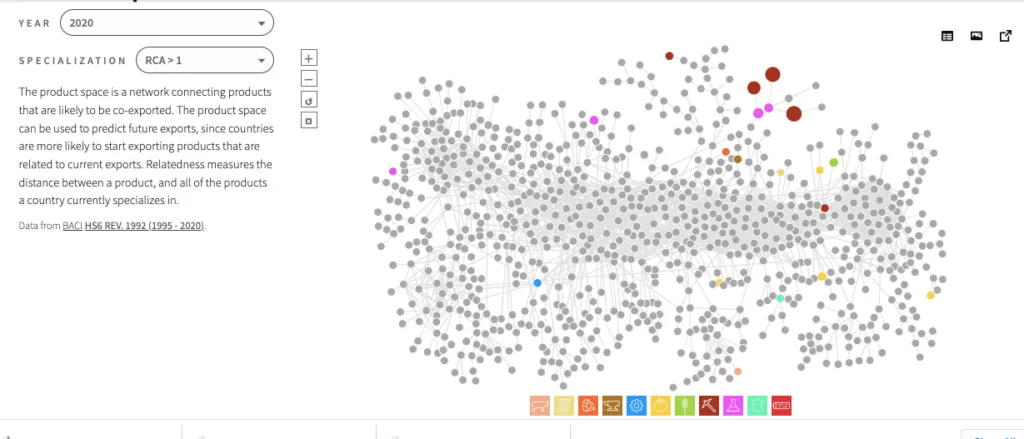
Source: oec.world
Best Business Opportunities To Start In Algeria
Source: starterstory.com
Age of Innovation
HR, Hybrid World
Education
Training on the Job
Training on the Job
© 2024 Altos Web Solutions. All Rights Reserved!